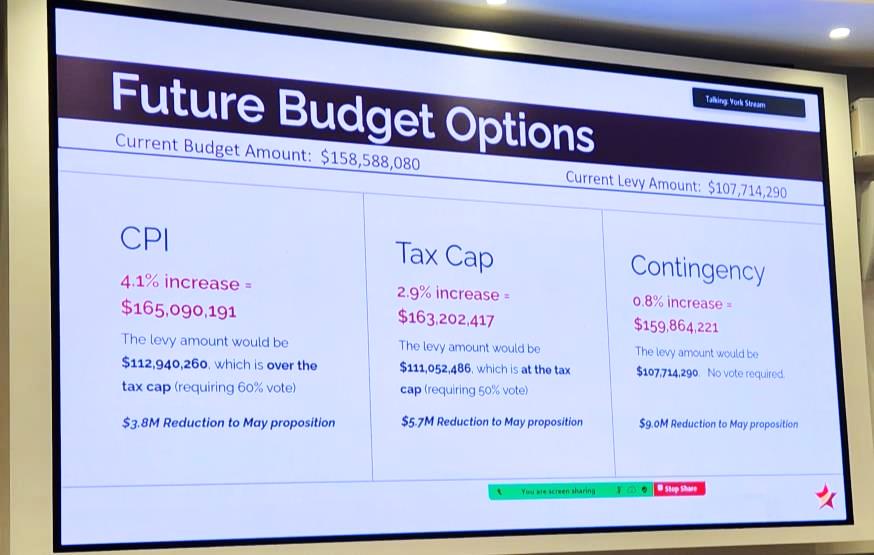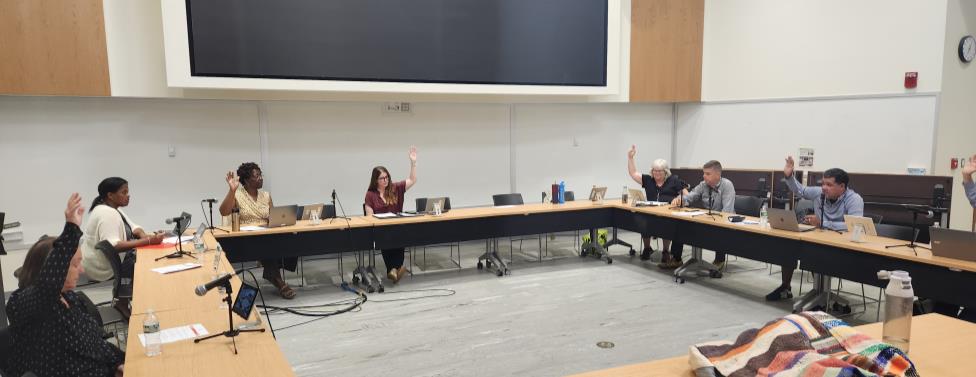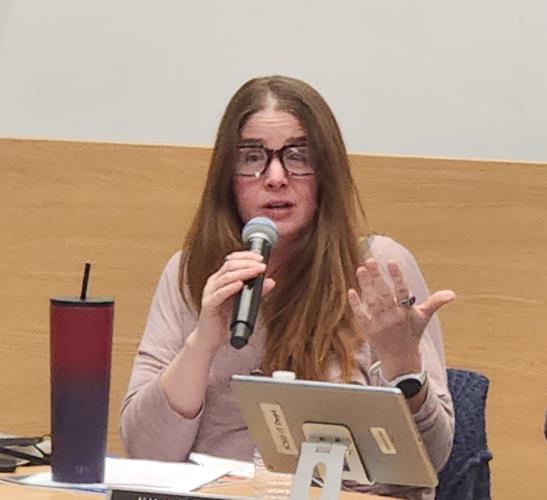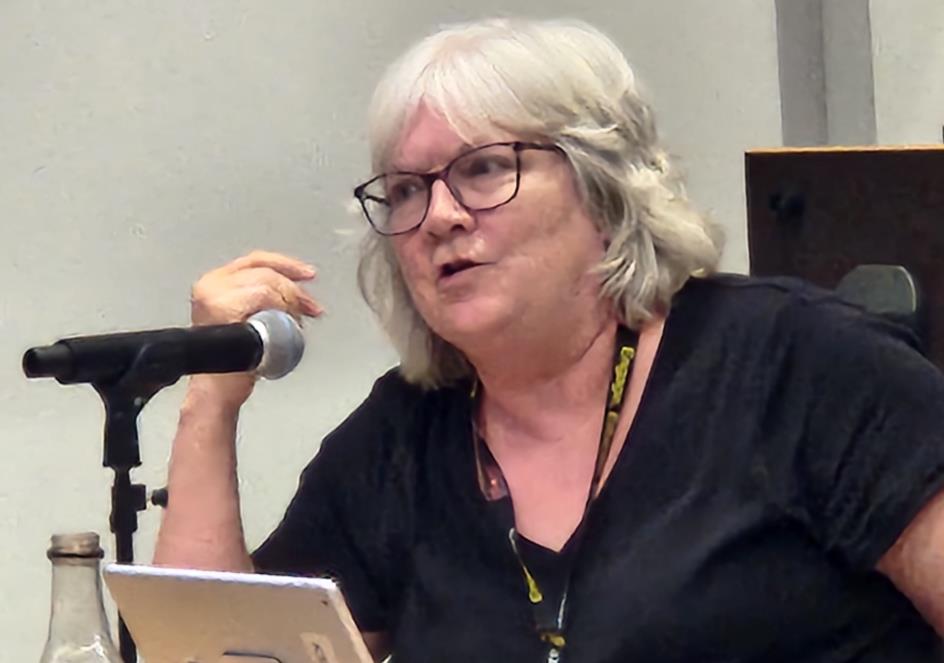No-increase “Contingency” among three options weighed

by Robert Lynch; May 22, 2024
Ithaca Board of Education President Dr. Sean Eversley Bradwell stated the obvious at one point in Wednesday’s discussion: We could submit the same budget, he acknowledged, “which would not be wise.”
No, it likely wouldn’t. A proposed $168.9 Million Ithaca City School District (ICSD) Budget for 2024-25 took a whumping in Tuesday’s high-turnout annual ICSD election. The budget, replete with its projected 8.4 per cent increase in the tax levy, lost voter support by a margin of greater than two-to-one; 2,059 votes in favor, 4,916 opposed.
Companion ballot propositions that would have bonded up to $125 Million for a laundry-list of capital projects and separately dedicated $3.2 Million in reserve funds to buy both electric- and propane-powered buses also failed by sizable margins.
Wednesday night, one day after the decisive rejections, the School Board regrouped. It met, as the law requires, to certify Tuesday’s election results. But members also took the opportunity to mull over in committee what to do next.
The certification meeting took just three minutes. But a Finance Committee session that preceded it dragged out far longer than scheduled. It consumed more than an hour. With most every board member in attendance, it effectively became a committee-of-the-whole meeting; one where members could both lick their wounds and also plan what to do next.
“What exactly am I certifying?” Board member Garrick Blalock asked as others placed the perfunctory certification motion on the floor.
“We may not agree with the results, but we need to vote,” Board colleague Karen Yearwood answered.

As far as next-moves, the Board made clear Wednesday it’s reading the electorate’s wishes. Board members’ presumed verdict: the rejected budget would have raised spending too high, and with it the tax levy. Even though the Board had trimmed spending and taxes in recent weeks from the plan administrators had first proposed, the budget put to voters would still have hiked spending by 6.5 per cent from the current year, and the tax levy even more, by 8.42 per cent.
This year’s rapidly-rising property assessments, which have tended to inflict pain disproportionately on individual Ithaca homeowners, have only deepened the dreaded tax bite.
“We have a lot to do,” Ithaca Schools’ Chief Operating Officer Amanda Verba began her presentation to the Finance Committee Wednesday. And with that, Verba guided the committee to three potential fallback options. It’s expected that one of those three—or perhaps an amalgam of the alternatives—will be placed before ICSD voters in a second referendum on June 18th.
New York State sets the re-vote date, should any district require one. And to comply with the law, the School Board will need to finalize any revised budget by June 4th. The Board plans to meet on the matter next Tuesday, May 28th. After this Wednesday’s meeting, President Eversley Bradwell said he may even call a special session before that date. And if a final plan can’t be agreed-to by the 28th, another special meeting shortly thereafter could follow.
“These are not the only options,” Eversley Bradwell cautioned the Board after Verba had outlined her three suggested revised budgets. But no member appeared eager to depart radically from the well-defined options the financial expert had presented.
Each would cut spending significantly from the budget that voters just rejected. The most generous among them would restrict spending increases to that of the Consumer Price Index (CPI). It would cut more than $3.8 Million from the rejected budget, but still increase outlays by 4.1 per cent from those of the current year. Its total spending would be $165 Million. The so-called “CPI Budget” would raise the tax levy by 4.85 per cent, down considerably from that of the budget rejected. Nonetheless, as this option’s levy increase still exceeds the state’s tax cap, it would require a 60 per cent super-majority to win approval.
Verba’s mid-ground choice would key the levy’s increase to the tax cap, thereby requiring only a simple majority of over 50 per cent to pass. Its $163.2 Million in spending would climb 2.91 per cent above that for the current year. Its tax levy would rise just 3.1 per cent from that of this year. It would cut more than $5.7 Million from the budget just rejected by voters. The “Tax Cap Budget” would reduce the levy increase by more than half from what the just-rejected budget would have imposed.
The third of Verba’s options would never need to be placed before voters. And should any trimmed-down intermediate option fail at the polls June 18th, this “Contingency Budget” would be forced on the District anyway by state law. The “Contingency Budget” keeps the tax levy rock-solid with that of the current year. The levy would not rise, but spending would inch up a bit, by eight-tenths of one per cent.
A Contingency would slash proposed spending greatly, cutting it $9 Million from what had been put to voters this week, a 5.37 per cent spending decrease. If Board members stand averse to any of the options presented Wednesday, this stood as the one they hated the most.

“A $3.8 Million reduction is serious; a $5.7 Million cut is serious; a $9 Million cut is beyond serious,” Eversley Bradwell reacted.
“Contingency would be catastrophic,” Board member Erin Croyle stated. Yet she said the other options would be bad as well. in mid-April, Croyle was the only member to oppose as too stingy the budget placed to Ithaca District voters this week. Instead, Croyle would have offered up School Superintendent Dr. Luvelle Brown’s initial submission, a nearly $171 Million budget with a tax levy hike of 12.14 per cent.
Croyle argued Wednesday that cutting the budget too deeply could affect her district’s ability to make good on plans to raise teacher pay significantly during future contract negotiations.
“We see a mass exodus of high-quality teachers,” Croyle warned.
While the $125 Million capital initiative could also see resubmission to the electorate at some future time—potentially later this year—that resubmission cannot by law come as quickly as the budget revision can… and must.
“Proposition 3 (the $125 Million capital plan), it has its own timetable,” Verba said. “We must wait 90 days to go back to the voters.”
Among the many capital investments the Ithaca District might undertake with its requested capital bonding over the next decade, replacement of the Bostwick Road Transportation Facility has become the firmest project identified so-far. Board members remain inclined to support bus garage replacement. But because of the timing restriction that precludes the bonding proposition’s immediate resubmission, the Finance Committee took little time Wednesday weighing its resubmission prospects.
However, the Board did discuss—with no immediate consensus—whether, and if so, how, to bundle the bus-purchase proposition together with the revised budget in the June referendum. Voters had Tuesday rejected, 2,980 (43.5%) in favor to 3,830 (56.5%) opposed, spending $3.2 Million to buy up to four electric buses and up to four more ultra-low emission propane buses, plus purchase a few other vehicles.
Two schools of thought emerged Wednesday regarding bus purchase bundling. Some members feared the second proposition could drag down the budget once again. Others argued it was best to re-work the lesser proposition—perhaps lessen the number of electric buses requested—and avoid the $40,000 expense of holding a separate referendum later.
“To focus the public’s attention on one vote (just the budget), wouldn’t we be better off?” Blalock asked.
“At some point in time, the district is going to have to play catch-up,” Eversley Bradwell countered, the Board President maintaining that delaying bus purchases this year would only impose added expense during years to come.
With the bus-bundling issue left unresolved, it could return as a focal point during next week’s meeting.
Yet coupled with the depth of budget cutting that faces the Ithaca School Board is the question of Board micro-management in making the painful cuts that will likely occur within the days and weeks ahead. Does the Board assume oversight, or does the Board leave it to Administration?
“What we have heard loud and clear is that this District would like to find some administrators cut,” member Jill Tripp firmly stated.

Member Eldred Harris reminded Tripp that leaders have repeatedly advised the Board and public that cuts would come first to administration as those they pay trim staff to satisfy Board-ordered reductions.
“I don’t need an answer tonight,” Tripp responded, “but I’m not very happy that we send it (namely, the prioritization of personnel cuts) back to staff.”
“I would rather not sit at the table and push against individual positions,” Harris rebutted.
“The public does not understand the trade-offs we are facing,” Blalock remarked. The public, he cautioned, sees “a big army of administrators,” an army which may not actually exist.
Eversley Bradwell said he’d rather not get “too specific” concerning staff cuts, suggesting it may be a topic better left to an executive session.
Eldred Harris, first elected to the Ithaca Board of Education in 2009, finished last among seven candidates in Tuesday’s race for three Board seats. Harris’ sadness and frustration surfaced for a brief moment during the Finance Committee meeting he chairs. Eldred Harris strongly supported the budget that voters rejected Tuesday along with him. He faulted tax-conscious taxpayers for thinking of themselves before they consider the students Ithaca must educate.
“They don’t have the community’s best interests in mind,” Harris started openly. “They have their pockets in mind.”
Harris fears the consequences which the voter-directed budget cuts—cuts likely to be finalized within days—will inflict. “We all made our beds,” Harris said. “We’re going to lie in them.”
###

